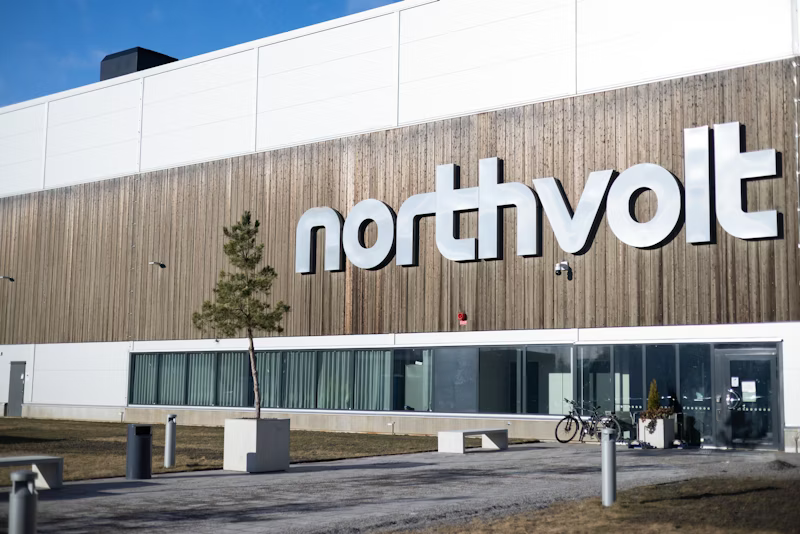
With the Northvolt mega-plant project on Montreal’s South Shore, François Legault hoped to make Quebec “a world leader in the green economy”. However, the Swedish multinational, which produces battery cells for electric cars, is now in hot water. In fact, the whole industry is in trouble.
Legault rolls out the red carpet
Legault and Trudeau had pledged $7.3 billion to attract the company, the former having already lent $240 million for the purchase of the lot. “Northvolt is the most important private project in the history of Quebec,” said former CAQ minister Pierre Fitzgibbon. The plan was to create 3,000 jobs, whereas the company employs over 5,000 worldwide.
For the Quebec government, any means were acceptable to ensure that the project went ahead. Not only did Legault pull out the checkbook to offer billions in public funds, he allowed the project to go forward without an investigation by the Bureau d’audiences publiques sur l’environnement (BAPE)—despite studies showing the negative impact of Northvolt’s plants on human health and the environment.
Similarly, it was recently revealed that in a meeting between Northvolt and a representative of Investissement Québec, the latter touted Quebec’s low wages as a way of attracting the company.
Here we have a clear case of government bending over backwards to please private-sector bosses.
The balloon deflates
In June, just as construction began on the first building of the Northvolt plant in Quebec, BMW cancelled a $3 billion order in response to the company’s production delays. The company then announced that it would reduce its local and international activities, cancel a plant project in Sweden, sell the site and cut jobs. It will delay its Quebec project by more than 18 months.
In reality, Northvolt is in serious financial trouble. Its expenses far exceed its revenues. It is not profitable and won’t be until 2026, according to its CEO. It posted a net loss of $1.2 billion last year, four times more than in 2022.
The reason for this debacle? The Swedish company has committed to more projects than it can deliver. Its production capacity is five times lower than it should be. The company is still small and doesn’t have as high a production capacity as its Asian competitors.
Northvolt tried to compensate for its weakness by making a lot of promises, which brought in a huge influx of capital. But it couldn’t follow through. The expansion was “a little too aggressive,” admitted the company’s co-founder. Now, faced with reality, Northvolt must drastically cut expenses.
A collapsing industry
Northvolt isn’t the only electric battery company in dire straits. South Korean giant SK On announced a state of “emergency management” in July; and LG Energy Solution, also from South Korea, has halted work at part of its Arizona plant.
Capitalists were dreaming of getting rich on the “green transition”. They foresaw considerable growth in demand for electric vehicles and have invested $520 billion in the battery industry since 2018.
But this growth is running out of steam and has stagnated this year. And for one obvious reason: a low-end electric car costs between $40,000 and $50,000, which remains out of reach for a large proportion of the working population.
“The industry is facing a bust without ever having had much of a boom,” says the Economist. Volkswagen is considering closing plants; Volvo and Mercedes-Benz are postponing their objectives of selling only electric cars. And their troubles trickle down to the battery producers.
Systemic agony
The battery industry in general and the Northvolt fiasco in particular are a perfect example of capitalist parasitism. Northvolt was promised $7.3 billion in Canadian public funds. The Biden-Harris administration will invest $3 billion in its electric battery industry. The Ontario government will pay one-third of Volkswagen’s and Stellantis’s production incentives and will give Stellantis $500 million to build its plant. But even with all these state subsidies, the industry is struggling.
Corporate dependence on the state is not limited to this industry, however. Thirty-two per cent of Canadian companies can be considered “zombies”, dependent on the state for survival. One study even shows that in 14 advanced economies, these zombies represented an average of two per cent of companies in 1980, rising to 12 per cent in 2016.
These figures reflect a general trend in capitalism: the deeper the system sinks into crisis, the more capitalists are reluctant to invest in production, even when they receive billions from the state. This trend is symptomatic of a system in decline.
And when it comes to the green transition, private enterprise and capitalist governments are clearly incapable of making it happen. The ruling class that destroys the environment seeks to profit from the green transition and leads it to a dead end. Only by pooling all society’s resources can we prevent climate catastrophe.

